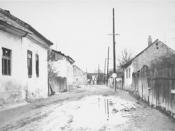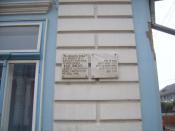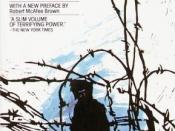For a series of several hellish months spent under the gun in the Nazi prison camps, Elie Wiesel had managed to survive the systematic slaughter of his fellow Jews. In his book Night, Elie Wiesel tells us of the relentless hunger and strife he, and his fellow Jewish brethren, experienced in order to elude the Nazi demise. Night gives us a first hand look into the Nazi concentration camps, such as the infamous Auschwitz, which served as platforms of death for the European Jews. Elie Wiesel focuses a great deal on people in his tale of Night, be they Minor characters or his own family, and the profound impact they had on him and others alike.
Wiesel tells us of his world in Night in a way that incorporates all the Jews impacted by the Holocaust. He dose this by integrating side stories of other characters which gives us a broad sense of what other the Jews had experienced durring their duration in the Nazi concentration camps.
Such an instance is described during a selection in Auschwitz. A man by the name of Akiba Drumer had regretfully found that his number was recorded during the selection. Elie describes that this news greatly disturbed Akiba; thus, he had lost all hope for living (Wiesel, 82-83). This was a common experience for countless Jews during the holocaust. We had even previously learned that Elie's own father fell victim to this same situaton, but luckily he managed to return unscathed.
Arguably, the most disturbing, yet poignant, side-story in Night is the event where Elie witnessed the Hanging of a young boy, and two other prisoners, for plotting an uprising. Elie describes the boy who was being hanged as being "sad-eyed angel" (Wiesel, 71). After the hanging ,all the prisoners were forced...


